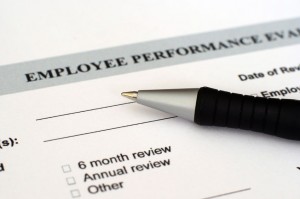Command Performance
 The infamous and often dreaded performance review is quite frankly just a part of the environment in most large corporations in 2013. They can be stressful for the employer and the employee. One reason is that managers often intensify the stress by postponing the important conversations and letting them build up. If the only feedback an employee gets is in the form of a six-or-12 month performance review, than it is most likely time to change that approach. Dropping bombs on employees once or twice a year only serves to build up pressure and make feedback sessions feel like indictments. And most importantly, it does little to alter behavior and improve performance and productivity.
The infamous and often dreaded performance review is quite frankly just a part of the environment in most large corporations in 2013. They can be stressful for the employer and the employee. One reason is that managers often intensify the stress by postponing the important conversations and letting them build up. If the only feedback an employee gets is in the form of a six-or-12 month performance review, than it is most likely time to change that approach. Dropping bombs on employees once or twice a year only serves to build up pressure and make feedback sessions feel like indictments. And most importantly, it does little to alter behavior and improve performance and productivity.
Why is the annual review stressful? Managers, simply, don’t want to do it. Employees dread it. The results can be skewed and biased. More feedback should be accessible to give an employee an opportunity to correct the problem if there is one. Corporate jargon, acronyms can often obscure the true meaning of a message. This obtuse language is pervasive in performance reviews.
As some companies flatten out their management hierarchies and encourage more team-work, they’re doing away with traditional top-down, manager-led performance reviews and leaning more heavily on the rank-and-file for evaluations. Some are using online technology to provide their workforce with more performance reviews throughout the year. Leading organizations will start to move toward more bottom-up feedback, recognition and rewards. Budgets will shift from traditional, top-down-determined, annual merit increases and incentive compensation to bottom-up, event-specific and more frequent rewards. As one Wall Street Journal article points out, the new approach is going to be more effective. The new breed of feedback is aided by a growing number of employee-recognition software programs and social networks that enable workers to post quick real-time comments, sometimes anonymously; solicit “how am I doing?” feedback; or post praise or recognition for a colleague.
The long and the short of it is, however, that performance views are still very much a part of the work environment, so learn how to prepare for them effectively. Document your achievements and list anything you want to discuss at the review. If you have not kept track of your achievements, you may have to spend some time figuring out what you have accomplished since your last review, and most importantly, how your employer has benefited, i.e. increased profits, grown the client roster, maintained older clients, etc. If you feel you have received an unfair review, you should consider responding to it. You should first try to discuss the review with the person who did it. Make sure, however, that you have interpreted your review objectively. Was the criticism fair? In the end, it is always best to regard your review as a learning opportunity. Take away information that may be valuable to your future – be it good or bad?
Source: “Here is Why We All Hate the Annual Performance Review.” TLNT. Web. 15 Jan. 2013.
Follow Us: Facebook – Twitter – YouTube – LinkedIn
